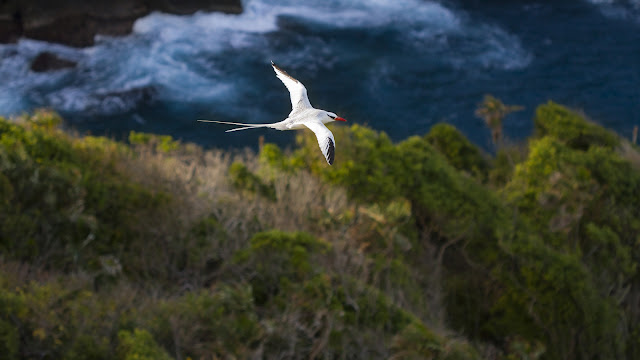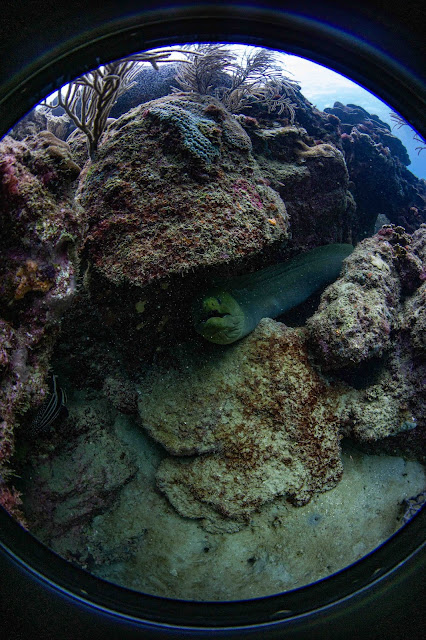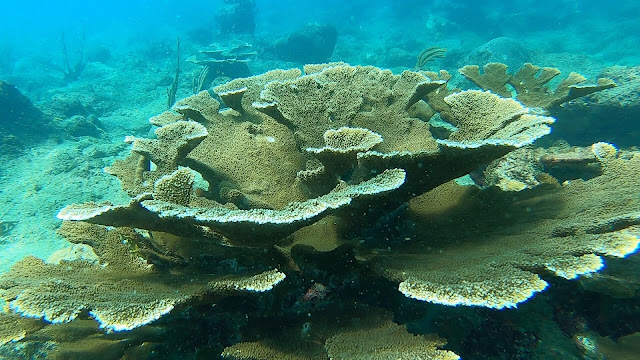A Change of Heart
 |
| Another world, underwater at Brothers rock, Caribbean Sea, off Tobago |
Who is Ron Tiah?
I grew up in Pointe-a- Pierre; my dad Robert Tiah was Rexformer Superintendent at the Texaco Refinery. I would say he was my mentor and hero. I inherited my love for the sea, the land and conservation from him. He cultivated one of the most successful citrus plantations in Trinidad, still operating today. He was also an academic, who insisted on further studies for me at Albert College and York University in Canada. I also wanted to learn to scuba dive.
In those days, late 70s, you signed up and had to be “accepted” to the scuba course. There were not many SCUBA instructors around; at the time, most were tough ex-military. The safety equipment we use today was still being developed, so to qualify for the course, you had to demonstrate strong swimming skills and overall strength.
Since we did not wear BCD’s to stay afloat (these look like life jackets), you had to be able to tread water and swim with all gear and weights in open water. Our gear included thick wet suits, heavy weights, heavy steel tanks. We would swim two
laps in the pool with gear, then tread water with weights and then do at least ten push-ups.
They had to make sure that you had the stamina to get to the surface and stay afloat after a dive. My first certification courses were NAUI ones.
I returned to Trinidad in the early 80s and went to work for the Royal Bank, in Pointe-a- Pierre. After nine years, I traded in the business suit for SCUBA diving suits. I became a PADI Instructor in 1986, and have been teaching diving ever since, sharing my love and passion for the sea and her marine life, with over 2000 certified divers. I estimate that in total hours, I have spent the equivalent of three years underwater, and to this day when I take a vacation, it is always to a destination where I can dive.
 |
| Ron Tiah with his camera |
Where were you diving?
I dived all around Trinidad: around the rigs in Point Fortin; off Toco and along the north coast. I was mostly spear-fishing for food fish. Over time, I have seen many changes in the ocean environment; I knew what fish were disappearing. Today, our fisheries are depleted. Fishermen are not catching the same fish, of the same size, or quantum, as before. The fish are just not there. Add to that the pollution that we inflict on the seas with runoff from the land: garbage, soil from land clearing and construction, oil and chemicals. That’s abuse.
As hunters, we have been blamed for some of the depletion. But scuba-divers should only take what we can eat and of a certain size. On hunting trips, the group is educated about the rules of game fishing; on my boat, we adopted the game fishing laws of Florida since we don’t have any in TT.
Today, we are lionfish hunters, since human intervention seems to be the only way to keep this invasive species in check. If we are hunting lionfish, then the hunters need to know about the lionfish: why we hunt them, their place – or not – in our reef environment; that they are eating all the juvenile fish needed for healthy reefs.
Scuba diving today is to encourage people to love the ocean; to appreciate the variety of species, to understand how it is all connected and connected with us. To scuba dive is more of an all-round education than any other.
 |
| On the Atlantic side of Tobago: brain coral at Speyside, photo by Ron Tiah |
When did the hunter turn protector?
On every scuba trip, you can’t help but see what’s going on in the ocean. I’ve had wonderful experiences in the water. I’ve seen orcas around the north coast of Tobago and Trinidad. I’ve had a family, two adults and a calf, come alongside the boat. The baby was 20 feet long.
These days, I shoot with my camera: manta rays and sharks in Tobago. Humans have to understand the shark’s role. We are not on their menu. With sharks, nature continues to take care of what’s injured or not healthy in the ocean.
Today, I am more of a conservationist than hunter.
What were some of your most memorable experiences in the ocean?
Sometime around 2003, in Charlotteville, we saw a big dolphin coming ashore followed by a pod of smaller dolphins. The big one seemed to be intent on beaching itself. The village came out and lifted the big one to turn it back to sea. We did this – it seemed for a long time – until they went out. It’s always a pleasure to be in the water with dolphins. If you are able to free dive down to 20 feet, they will play with you.
I also remember an interaction with a manta ray caught in a fisherman’s net. The fisherman wanted to get it out without damaging his net. When we freed it, the manta turned back and came close. It looked me up and down before swimming away.
I’ve had similar experiences with sharks (in Florida), where there is a growing practice by the more experienced shark divers to remove fish hooks from their mouths. Don’t expect sharks to be well-behaved especially if you have a fish on your hook or spear. They will take it from you. But they do check you out. They can sense what you are feeling, fear or curiosity. In Tobago, they keep a distance.
I’ve also seen octopuses. In the daytime, they are hard to see, blending in with the sand and rock. But shine a light on an octopus in the night. And it’s a psychedelic show. They don’t know what colour to become!
 |
| In the Caribbean sea, an octopus at night, at Charlotteville, photo by Ron Tiah |
What would you want to tell people – especially those who don’t dive – about the ocean?
We have to stop treating it like a dumping ground. When the Charlotteville health centre was being built, too much of the excavated dirt was dumped on the ridge above Speyside. Now, every time it rains, that mud washes down the Speyside river into the sea. It is smothering that lovely reef just in front the waterwheel.
We are not doing enough to educate our peoples: we live on an island and we need to preserve our underwater habitats.
We also need to educate our divers; simple protocols like removing garbage when you see it on the reef; like not leaning up against the brain coral to take photos because that slime you lean on is part of the living organism.
We need to tell everyone that tourists prefer to go to destinations that protect their environment; that you can fill your hotels if you appreciate and protect what you have.
The Main Ridge Forest Reserve mirrors the ocean around the north of Tobago. We need to protect both environments: no touching, no taking, no fishpots, no anchors across the reef. The Caribbean and Atlantic sides of the north of Tobago feature unique and different topography and there’s opportunity to encounter amazing wildlife, dolphins, hammerhead sharks, rays.
What is the role of the diver?
Scuba diving bestows privilege and responsibility: the privilege to enter this different bigger world. Divers need to be educated about what they encounter underwater. Then you have a responsibility to share the knowledge. My passion is total for the protection of our ocean environment.
Scuba diving is something every young person needs to do. They are the ones to deal with the environmental challenges, as doctors, lawyers, teachers, leaders. In whatever professions they choose, they have to help clean up the mess; stop the hunting of turtles and sharks; change the legislation; change attitudes. Their attitudes will change the future.
 |
| The reef at Speyside, Atlantic side of Tobago, photo by Ron Tiah |


